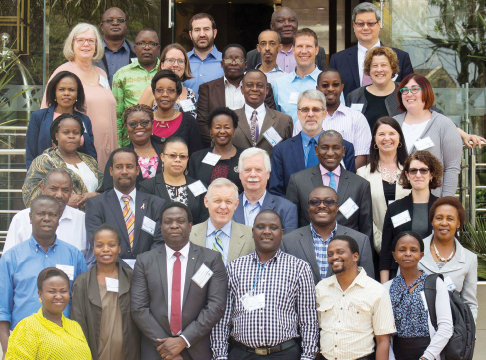IBM, the American Cancer Society (ACS), the National Comprehensive Cancer Network® (NCCN®), and the Clinton Health Access Initiative (CHAI) recently announced a new alliance—Allied Against Cancer—to help improve access to high-quality cancer care and treatment in Sub-Saharan Africa. The Alliance will support a network of African oncology experts and technical assistance partners to help improve the quality of cancer care, including collaborating closely with the African Cancer Coalition to establish priorities and execute these initiatives locally.
There are more than 800,000 new cancer cases each year in Sub-Saharan Africa, and the incidence is projected to double by 2040. As these countries address the growing cancer epidemic, data and emerging technologies can play a significant role in cancer treatment control and care. The need for more affordable cancer treatment and strong systems for their delivery are crucial to help improve patients’ survival.
Team Effort
To address gaps in access to cancer medicines, ACS and CHAI teamed up in 2016 to bring lower prices to 16 common chemotherapy drugs to a half dozen countries in Sub-Saharan Africa. Top American oncologists have supported the African Cancer Coalition—comprising 110 African oncologists, representing 34 hospitals from 13 countries in Sub-Saharan Africa—to adapt cancer-treatment guidelines for use in African hospitals.
The African Cancer Coalition, working with experts from NCCN, adapted the 46 NCCN Clinical Practice Guidelines in Oncology® and the NCCN Framework for Resource Stratification of NCCN Guidelines to create the NCCN Harmonized Guidelines™ for Sub-Saharan Africa, specifically to be used by oncologists across this area. To date, these Guidelines have been endorsed by leading cancer centers or health ministries in six countries.
Online Tools
IBM then developed an online tool called Cancer Guidelines Navigator to provide African oncology professionals with interactive access to the NCCN Harmonized Guideline for Sub-Saharan Africa at no charge. Oncologists based in Sub-Saharan Africa can input a clinical description for a patient with cancer—such as tumor type, stage, biomarker status, and prior treatments—into the online tool. The Cancer Guidelines Navigator then points the user toward relevant treatment options input from the NCCN Harmonized Guideline. At this time, the tool includes NCCN Harmonized Guidelines for cervical cancer, prostate cancer, breast cancer, diffuse large B-cell lymphoma, and Kaposi sarcoma.

The African Cancer Coalition. © Kot Kay Pixels
Furthermore, IBM also helped to transform the ACS ChemoSafe Facility Assessment Tool—from an Excel-based document to an interactive, easy-to-use mobile application—to scale the program’s goal of improving the safety and quality of chemotherapy handling in cancer centers. This tool, which is accessible at no cost on iOS or Android mobile phones or tablets, allows health-care workers to review the safety of hazardous drugs at each location where they may be handled in their health-care facility, including pharmacy receiving, treatment areas, housekeeping, and waste areas. Upon completion of the assessment, the tool provides recommendations to help improve the handling of hazardous drugs at potential points of exposure, based on international and national standards. This information may be used by hospitals to create policies and budgets supporting quality improvement. ■

